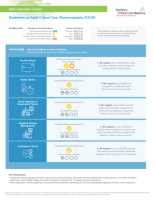

Guidelines on Adult Critical Care Ultrasonography: Focused Update 2024
Citation: Diaz-Gomez JL, Sharif S, Ablordeppey E, et al. Society of Critical Care Medicine guidelines on adult critical care ultrasonography: focused update 2024. Crit Care Med. 2025;53(2):e447-e458.
Critical care ultrasonography (CCUS) is rapidly evolving with new evidence since the publication of the 2016 guidelines. This focused update provides current evidence to assist clinicians in performing CCUS in five essential clinical scenarios: cardiac arrest, sepsis, acute dyspnea/respiratory failure, volume management, and cardiogenic shock.
In adult patients with septic shock, acute dyspnea/respiratory failure, or cardiogenic shock, the guidelines panel suggests using CCUS to guide management. Given evidence supporting an improvement in mortality, the guideline panel suggests the use of CCUS for targeted volume management as opposed to usual care without CCUS. There were insufficient data to determine whether CCUS should be used over standard care without CCUS in the management of patients with cardiac arrest.
Guideline Type: Clinical
Related Resources:
Executive Summary: Adult Critical Care Ultrasonography: Focused Update 2024
 |
Visual Abstract: Guidelines on Adult Critical Care Ultrasonography |
Identifier:
We suggest either using CCUS or usual care without CCUS to guide management of adult patients in cardiac arrest.
Quality of evidence: Very low
We suggest using CCUS in the management of adults with septic shock to improve clinical outcomes.
Quality of evidence: Low
We suggest using CCUS to aid with diagnoses and to guide the management of adults with acute dyspnea or acute respiratory failure to improve clinical outcomes.
Quality of evidence: Low
We suggest the use of CCUS for targeted volume management compared with usual care without CCUS in acutely ill adult patients to improve clinical outcomes.
Quality of evidence: Low
We suggest the use of CCUS compared with usual care without CCUS in adults with cardiogenic shock to improve clinical outcomes.
Quality of evidence: Very low
CCUS = critical care ultrasonography.